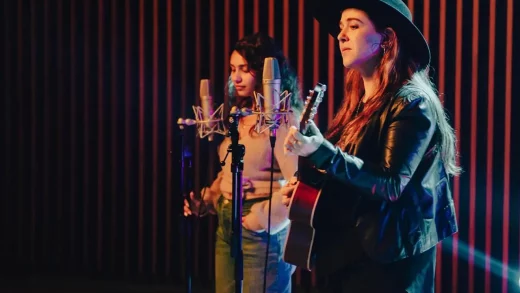:format(webp)/https://www.thestar.com/content/dam/thestar/entertainment/stage/review/2023/05/26/kate-hennig-is-a-commanding-momma-rose-in-the-shaw-festivals-gypsy/louise_and_momma_rose_gypsy.jpg)
Gypsy
Book by Arthur Laurents, music by Jule Styne, lyrics by Stephen Sondheim, suggested by the memoirs of Gypsy Rose Lee. Directed by Jay Turvey, musical direction by Paul Sportelli. At the Festival Theatre, 10 Queen’s Parade, Niagara-on-the-Lake, through Oct. 7. shawfest.com or 1-800-511-7429
It’s Kate’s turn. And Julie’s too.
It’s been nearly four years since the Shaw Festival first announced a production of the musical “Gypsy,” with multi-faceted Canadian theatre luminary Kate Hennig as the ultimate stage mother, Momma Rose.
Multiple pandemic-related delays later, the production has finally arrived and Hennig’s take on Momma Rose is as nuanced, powerfully sung and grotesquely compelling as hoped, all leading to a commanding performance of the 11-o’clock number “Rose’s Turn.”
Yes, grotesque: Momma Rose has a monstrous quality and the musical has the arc of a tragedy as her impossible ambition repels the people closest to her and destroys her relationships and, perhaps, her mind. Hennig brings her significant acting chops to bear in this characterization and gives us access to the psychological machinations behind Rose’s increasingly desperate actions.
As Rose spins down, so her older daughter Louise (Julie Lumsden) ascends. The character is based on the world-famous burlesque artist Gypsy Rose Lee, whose memoirs inspired the musical.
Initially neglected by her mother in favour of younger sister June (Madelyn Kriese), whom Rose tries to make into a vaudeville star, teenage Louise plays make-believe with stuffed animals in the lovely solo number “Little Lamb” and fantasizes about a normal family life with June in the bravura “If Momma Was Married.”
In the second act, dynamics radically shift as Rose forces Louise to become a stripper and Louise, taking control of the pathetically repeated song “Let Me Entertain You,” performs a triumphant burlesque act based on suggestion rather than exposure. That number is the production’s most impressively staged, with Lumsden appearing in a series of sensationally beautiful and flattering gowns against clever sets (design by Cory Sincennes) and clever lighting (by Kevin Fraser), delivering the material with a powerful voice and knowing manner.
This complex mother-daughter struggle around power, sexuality and gender is the most effective element of Jay Turvey’s production and could still be explored further.
Rose’s relationship to her own sexuality comes across as uncharted or somehow taboo — Sincennes’ costumes for Hennig seem purposely frumpy — and it’s difficult to understand what fuels the connection between Rose and her long-suffering boyfriend/agent Herbie (Jason Cadieux does his estimable best in this underwritten role).
The overall conceit of Turvey’s production is meta-theatrical: the action is set on a bare stage, with set pieces brought on and off to suggest but not fully simulate locations. This perhaps places us inside Rose’s consciousness — for her, it’s always showtime — but this too feels like it could be taken further.
From a musical standpoint the production is resplendent. The score has great numbers to spare, including “Everything’s Coming Up Roses” and “Together (Wherever We Go)”, with music by Jule Styne, book by Arthur Laurents and exquisite lyrics by the then still-emergent Stephen Sondheim. The orchestra is in full force under Paul Sportelli’s baton, and it feels positively luxurious to bask in the show’s music from its celebrated and lengthy overture through Hennig tearing down the house in “Rose’s Turn.”
With a significant and impressive supporting cast, two superb central female performances and still some room to grow, it’s great to see this “Gypsy” finally take its turn at Shaw.
JOIN THE CONVERSATION
does not endorse these opinions.



